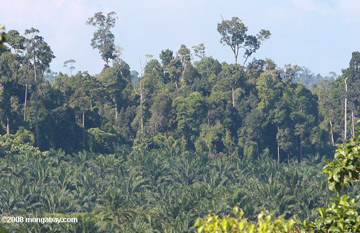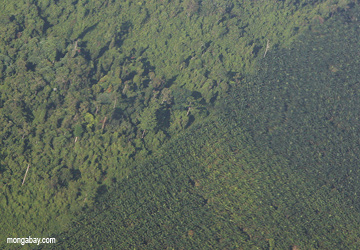Half of oil palm expansion in Malaysia, Indonesia occurs at expense of forests
Half of oil palm expansion in Malaysia, Indonesia occurs at expense of forests
mongabay.com
May 20, 2008
|
|
More than half of the oil palm expansion between 1990 and 2005 in Malaysia and Indonesia occurred at expense of forests, reports a new analysis published in the journal Conservation Letters. The conversion had a “detrimental” impact on regional biodiversity say the authors.
Analyzing data from the United Nations Food and Agriculture Organization, Lian Pin Koh and David S. Wilcove of Princeton University found that 55-59 percent of oil palm expansion in Malaysia and at least 56 percent of that in Indonesia occurred at the expense of forests. Given that oil palm plantations are biologically impoverished relative to primary and secondary forests, the researchers recommend restricting future expansion to pre-existing cropland and degraded habitats.
  Oil palm plantation and logged-over forest in Borneo. Oil palm plantations are biologically depauperate relative even to heavily logged forests according to research on birds and butterflies. |
In recent years Malaysia and Indonesia have rapidly expanded the area of land devoted to oil palm cultivation: between 1990 and 2005 the area of oil palm plantations in Malaysia more than doubled to 3.6 million ha; in Indonesia the area planted with palm expanded by more than 270 percent to 4.1 million ha. At the same time Indonesia’s forest cover declined by 28 million ha, while Malaysia lost some 1.5 million ha. Koh and Wilcove calculate that at least 1.704 million ha of forest land in Indonesia and 1.04 million ha in Malaysia were converted for the oilseed during the period.
“Our analysis indicates that oil palm plantations in Malaysia and Indonesia have replaced forests and, to a lesser extent, pre-existing cropland,” the authors write.
Using data on birds and butterflies showing that conversion of forest to oil palm produces steep declines in species richness, Koh and Wilcove say the expansion of the oil palm estate in Malaysia and Indonesia negatively affected regional biodiversity.
Noting that demand for palm oil is expected to increase dramatically in coming years, the authors suggest future oil palm expansion be limited to lands that have already been converted for agriculture or are otherwise heavily degraded. Even logged forests — which support considerably higher levels of biological diversity than plantations — should be off-limits to oil palm development, they conclude.
Lian Pin Koh & David S. Wilcove (2008). Is oil palm agriculture really destroying tropical biodiversity? Conservation Letters. May 2008 (Vol. 2 Issue 1 Page 1-5)
Sustainability conference reveals a rift in the Malaysian Palm Oil Council
(05/01/2008) Last month’s sustainability conference sponsored by the Malaysian Palm Oil Council (MPOC) revealed a rift between some planters and the industry marketing organization. Speaking on the condition of anonymity, several oil palm plantation executives distanced themselves from a video created by the MPOC as well as closing remarks by the group’s CEO, Tan Sri Datuk Dr. Yusof Basiron. They said the video and comments provided ammunition for NGOs that accuse the MPOC of greenwashing.
Palm oil boycott an unrealistic approach to conserving biodiversity
(04/15/2008) Boycotting palm oil produced in Southeast Asia in an “unrealistic” and “ineffective” approach to conserving the region’s fast-disappearing rainforests, said a Princeton University researcher speaking at a conference on the sustainability of palm oil. Instead, NGOs should focus on engaging and working with the palm oil industry to reduce its impact on the environment. Addressing the first International Palm Oil Sustainability Conference in Kota Kinabalu, Malaysia, Princeton biologist Dr. David S. Wilcove said that the palm oil industry is too important to the economies of Indonesia and Malaysia to justify blanket import bans on the edible oil used in food, cosmetics, industrial products, and biodiesel. The palm oil industry contributes to health, education, and infrastructure in rural areas.